The quiet village of Fellowship, Mahaicony is surrounded by a lot of huge trees and you have to look carefully to find some of the houses that are hidden among them. In almost every yard there are mango, coconut and other fruit trees.
Nicketa Thomas was making use of the shade under a big mango tree in front of her yard. She had tied a hammock under the tree and was enjoying the breeze as she listened to music from her cellular phone and rocked her baby, Jaden. She works at Qualfon on the East Coast and was on the evening shift that day. A customer service representative, her job entails activating phones.
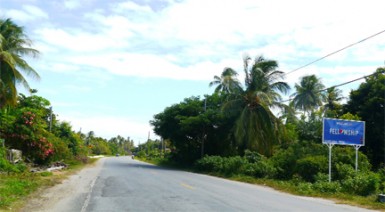
The village was actually a coconut estate and many of the residents are into the coconut business, making oil, copra or brooms to sell. Some are engaged in cash crop and livestock farming while others, like Nicketa, seek employment outside the village. Residents operate a small shop, a trucking service and an electrical workshop.
Winston Blair, an electrician deals with repairs to television and other appliances, and the installation of satellite dishes. He was busy fixing an APC backup battery when this newspaper dropped in at his workshop. Work was “slow at the moment because the year just started,” he said, but he would be busy around Christmastime. An ex-soldier in the Guyana Defence Force, Blair had attended the Government Technical Institute where he learnt his trade. About 20 years ago he returned to the village and set up his workshop and has been “working in and out.”
He told Sunday Stabroek, “the work had gotten so bad that I had to run and leave it; leave Guyana. I went to Barbados and spent a year there and came back and I’m trying with it again.”
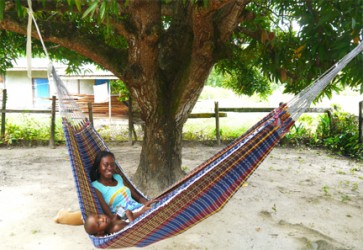
He said too, “it is not a job that can really sustain you… You have to do something else, especially in this particular area” where the population is small.
Blair said some persons would repair their appliances but others would “prefer to purchase new ones and dump the old ones.”
“It is not practical to survive on this business alone; you have to get something else to back you up.” He mentioned that his wife operates a stall in the market, and that this “is my main source of backing up.”
Residents enjoy a reliable supply of water, electricity and telephone services. Blair emphasized too that “the people are very, very friendly and very co-operative in this place. We don’t have problems with anyone.”
The biggest problem for villagers is that the streets are in a deplorable condition and have not been fixed, “for heaven knows why. All of the other surrounding villages have good roads.”
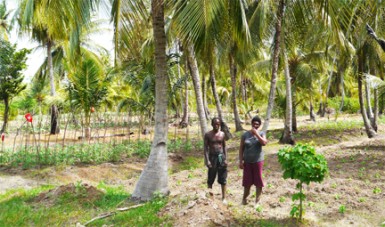
Blair lamented that as soon as it rains the streets become almost impassable. Government officials promised to fix the streets last year but nothing was done.
He is hoping that this year they would keep their promise to repair the roads. “I hope that they have elections every year because when it is elections time everything gets fixed…”
Jacklyn Duke had moved to the Pomeroon when she got married. She is now separated from her husband and returned to the village about 15 years ago. Her three children are all grown and living alone. She prefers to live in her own village because “Pomeroon is sheer water. Anywhere you want to go you have to get a boat. You want to go to the shop or your next door neighbour, you have to use boat.”
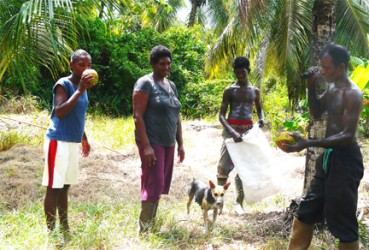
She rears livestock for a living and had already taken her cows to the backdam to graze while she had the goats and poultry in the pens in her yard. Jacklyn had a lot of goats but said persons “thief out plenty when they go down to the backdam to graze… I would still send them there
though because wah I gon do?”
Across the street, Susan Richmond, 17, was alone at home helping with the household chores. Her parents, Alfred and Trudy Richmond and brother, Samuel, 15, were busy working on their coconut and cash crop farm. Their dog, Fada, was also in the thick of things, keeping them company.
We walked a short distance to the farm where her parents came out to greet us. Alfred Richmond was happy for this newspaper’s visit. Using a long rod he picked some delicious water coconuts for his family and also shared them with this reporter. He just planted a few of those trees for “home use.”

He was eager to talk about a problem affecting him and his five siblings who own portions of the estate. He pointed out that his family used to maintain the trench in front of their farms. A few years ago though, officials from the Mahaica-Mahaicony-Abary/ Agricultural-Development-Authority (MMA/ADA) “came in and say they would dig it and then they would pay somebody within the area to keep it up. But they never did anything…”
He said they were willing to start maintaining it on their own but it was in a bad shape and needed to be excavated. “Water can hardly come in from the Bellamy canal,” he lamented.
In between the coconut trees were neatly laid-out beds of peppers, tomatoes, bora, boulanger and ochro. He had planted watermelon on another plot nearby but had to abandon it because of a lack of water.
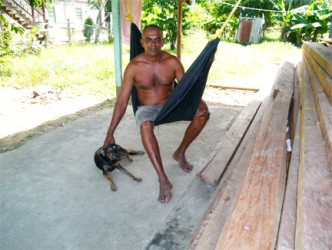
He said the plants would be “left to the mercy of God. We just pray and beg God to do something for us here. We don’t have any other source of water, we can’t even pump.” Besides, he said, saltwater seeps in with the little rain and is destroying his crop.
He is not worried so much about the other “permanent crop,” including mangoes and other fruit trees. He has been doing the coconut business “all through my life…” making oil and selling most of the nuts to middlemen for export. He is also looking for more markets for the coconuts and said he can supply any amount to people. But from time to time I would leave and go in the interior to do mining. But the safest thing is to be with my family.”
Richmond pointed out that the coconut industry is not viable at the moment so he was supplementing it with his cash crop business. But the water situation may “drive me to go back to the interior.”
Three of his older children have completed school and help him and his wife, Trudy on the farm. He complained that his street, especially the front part, needs repairing. It is their only access to their homes and to transport their produce from the farms.
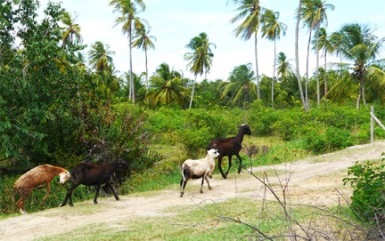
Cattle farmers are having difficulty accessing land for their livestock to graze on. A bridge that the animals would cross to reach another portion of land was broken a few years ago and badly needs to be rebuilt.
Richmond was still distressed that he was forced to “sell out my cows because I din have anywhere for them the graze.” He said the animals “would be taken to the pound if they destroy anybody’s crop and the pound fees are very high.” This newspaper observed that a section of a drain along the dam had started to erode. Residents said it was caused by cows that tried to access grazing grounds.
Lyrna Peters, a seamstress who lives close to the roadside had taken a break for lunch. A friendly and accommodating woman, she was also tending to her grandson and another little boy who stays with her until his mother, a teacher, returns from work.
Peters specializes in all types of ladies clothing, including wedding dresses, bridesmaids’ and evening gowns, casual outfits and uniforms. She became the sole breadwinner of the home after her husband, Fredrick Peters, a former diver in the interior suffered an ailment.
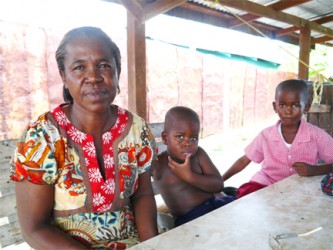
Next door, Seeranie ‘Momso’ Chan was sitting under a shed in her yard making pointer brooms to sell at the Mahaica market. She has been doing the business for over 20 years. She continued to strip the pointers really fast even as she spoke to this reporter. In one week she would make about 80 to 100 brooms which she would sell at $300 each. Nearby was a sign that read: “for sale: pluck chicken, wholesale and retail.”
Her husband who owns a coconut farm, along with her grandson would cut the branches for her. The two would also be engaged in making copra or selling to the trucks that come from the East Coast area.
Roseann Martin had finished her chores and was rocking in a hammock under her brother’s house. She was staying there to take care of her seven-year-old nephew who attends the School of the Nations in Georgetown. Her brother and his wife run a grocery store in another section of Mahaicony. She finds the village peaceful and said she loves living there.
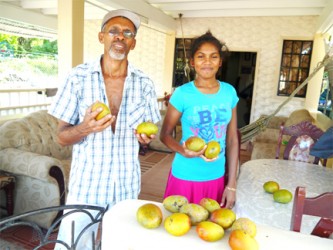
Her father, Alfred Martin who resides down the street was taking some juicy mangoes for her at the same time that this newspaper dropped in. The man who has been a carpenter and painter for 40 years was concerned about the condition of the streets as well.
Vishan Bankay was also relaxing in his hammock outside his one-flat concrete house when this newspaper arrived. His dog started to bark fiercely and Vishan had to restrain it from charging at this reporter. He also owns a house at Moraikobai up the Mahaicony River.
A logger and livestock farmer in that area, he stays there sometimes with his wife and four younger children. At other times he would be in the village with his two older daughters who attend school on the coast. He is hoping to move back fully to Fellowship and already had materials stocked in is yard to extend his house. He has applied for electricity but has not gotten through as yet.




